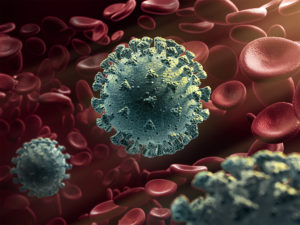Anti-clotting Drugs to Save Lives of COVID-19 Patients in Ventilators

Source: Beth Israel Deaconess Medical Centre Press Release
“If positive, findings could alleviate expected shortage of ventilators for patients with severe COVID-19 infections.”
BOSTON — While the majority of people with COVID-19 won’t require hospitalization, those who do are likely to seek medical help as a result of acute respiratory distress syndrome, or ARDS, a severe lung injury common in patients with critical illnesses. At present, there is no effective treatment for ARDS other than supportive care with mechanical ventilation.
A team of physician-scientists at Beth Israel Deaconess Medical Center (BIDMC) — part of Beth Israel Lahey Health — are now enrolling patients in a clinical trial to evaluate a common anti-clotting drug for the treatment of COVID-19-positive patients with ARDS. The newly launched trial follows a special report the team published in the Journal of Trauma and Acute Care Surgery that suggested the use of a drug called tPA could reduce deaths among patients with ARDS as a complication of COVID-19.
Epidemiological models predict that thousands of Americans will require mechanical ventilation in the coming months as a result of the COVID-19 pandemic, far exceeding the estimated 200,000 ventilators currently available in the United States.
“As the global pandemic of COVID-19 begins to oversaturate the world’s medical capacity to accommodate a surge of patients with ARDS, it’s critical we consider how existing therapies that are widely available may be of use in this unprecedented public health emergency,” said the special report’s lead author and clinical trial investigator, Christopher D. Barrett, MD, a senior surgical resident at BIDMC and a research fellow at MIT.
“If effective and safe for the treatment of ARDS in patients with COVID-19, tPA could save lives by reducing recovery time and freeing up more ventilators for other patients in need.”
An anticoagulant naturally produced by the body, tPA was approved by the U.S. Food and Drug Administration in 1996 for use in patients experiencing heart attack, stroke and pulmonary embolism. Researchers have considered the use of anti-coagulant drugs to reduce ARDS-induced death for two decades. Though the approach has never been widely adopted or formally FDA-approved, a clinical observation made about a subset of patients with COVID-19 induced ARDS made the idea seem newly relevant.
“We’re hearing anecdotally that a subset of patients with COVID-19 induced ARDS are clotting abnormally around their catheters and IV lines,” said senior author, Michael B. Yaffe, MD, PhD, an attending surgeon in the departments of Acute Care Surgery, Trauma, and Surgical Critical Care, and in Surgical Oncology at BIDMC. “We suspect these patients with aggressive clotting are will show the most benefit from tPA treatment, and this new clinical trial will reveal whether that’s the case.”
Led by Yaffe, Barrett, and colleagues from BIDMC’s Department of Anesthesia, Critical Care and Pain Medicine, including Shahzad Shaefi, MD, and Department Chair Daniel S. Talmor, MD, MPH, the tPA clinical trial is now open and enrolling patients with COVID-19 induced ARDS admitted to BIDMC. Next steps will include identifying biomarkers — measurable characteristics such as blood levels of clotting factors — to help more accurately determine which patients are most likely to respond to tPA as a treatment for ARDS, said Yaffe, who is also a Professor of Biology and Biological Engineering at the Massachusetts Institute of Technology.
The collaborative research was facilitated by Beth Israel Lahey Health COVID-19 Innovation Hub — an effort led by Gyongyi Szabo, MD, PhD, Chief Academic Officer at Beth Israel Lahey Health — to address the emerging challenges related to the pandemic.
Since the publication of the special report on March 23, Barrett and Yaffe have already heard from physicians across the country eager to try tPA for the treatment of COVID-19 induced ARDS. Because the medication is an FDA-approved drug already in widespread use for patients who have had heart attacks or strokes, doctors are permitted to prescribe it for off-label usage.
In addition to Barrett and Yaffe, co-authors on the special report included: Daniel S. Talmor, MD, Chief of the Division of Anesthesia, Critical Care and Pain Medicine at BIDMC; Hunter B. Moore MD, PhD, Ernest E. Moore MD, Peter K. Moore, MD, and Robert C. McIntyre MD, of the University of Colorado; Frederick A. Moore, MD, of the University of Florida, Gainesville.
About Beth Israel Deaconess Medical Center
Beth Israel Deaconess Medical Center is a patient care, teaching and research affiliate of Harvard Medical School and consistently ranks as a national leader among independent hospitals in National Institutes of Health funding.
BIDMC is in the community with Beth Israel Deaconess Hospital-Milton, Beth Israel Deaconess Hospital-Needham, Beth Israel Deaconess Hospital-Plymouth, Anna Jaques Hospital, Cambridge Health Alliance, Lawrence General Hospital, Signature Healthcare, Beth Israel Deaconess HealthCare, Community Care Alliance and Atrius Health. BIDMC is also clinically affiliated with the Joslin Diabetes Center and Hebrew Rehabilitation Center and is a research partner of Dana-Farber/Harvard Cancer Center and the Jackson Laboratory. BIDMC is the official hospital of the Boston Red Sox. For more information, visit www.bidmc.org.
BIDMC is part of Beth Israel Lahey Health, a new health care system that brings together academic medical centers and teaching hospitals, community and specialty hospitals, more than 4,000 physicians and 35,000 employees in a shared mission to expand access to great care and advance the science and practice of medicine through groundbreaking research and education.
For more information: Jacqueline Mitchell 617-667-7306; jsmitche@bidmc.harvard.edu



